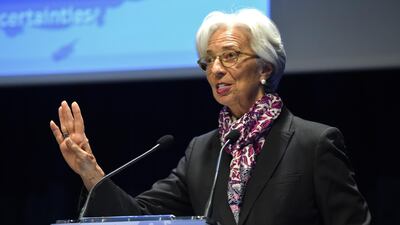The rise in financial technology, or FinTech, has the power to significantly disrupt the global financial system because of the increasing presence of tech giants in areas such as payments, International Monetary Fund managing director Christine Lagarde said.
“A significant disruption to the financial landscape is likely to come from the big tech firms, who will use their enormous customer bases and deep pockets to offer financial products based on big data and artificial intelligence,” Ms Lagarde told a FinTech symposium held on the sidelines of the G20 finance leaders’ meeting in Fukuoka, Japan, according to Reuters.
While such innovation from the world’s biggest tech firms could help modernise financial markets, it could give them a concerning monopoly and mean many of the world’s cross-border payment and settlement mechanisms fall under their control, she said.
Among other things, FinTech helps to speed up payments and remittances transactions and strengthens the underlying monitoring systems that record such transactions.
Global interest in FinTech has soared in recent years, as more players enter the market and demonstrate how advanced technology can be deployed to cut costs and better serve customers. Banks and other institutions are looking to collaborate with emerging FinTech operators to future-proof their businesses, or risk becoming obsolete as tech-enabled rivals provide cheaper, faster services.
But Ms Lagarde said the growing participation of technology firms in the financial services industry poses risks and increases the need for tight regulation of the fast-growing FinTech sector.
“This presents a unique systemic challenge to financial stability and efficiency, and one I hope we can touch on during the G20, and address in a cooperative and consistent fashion,” she said.
In particular, China presents an example of the trade-off between benefits and challenges posed by financial technology. “Over the last five years, technology growth in China has been extremely successful and allowed millions of new entrants to benefit from access to financial products and the creation of high-quality jobs,” she said.
“But it has also led to two firms controlling more than 90 per cent of the mobile payments market.”
In an IMF blog post from March last year, Ms Lagarde said governments seeking to regulate FinTech face challenges. “Their task isn’t an easy one,” she wrote. “On the one hand, they must protect consumers and investors against fraud and combat tax evasion, money laundering, and the financing of terrorism, ensuring that risks are thoroughly understood and managed. They must also protect the integrity and stability of the financial system.
“On the other hand, they must beware of stifling innovation that responsibly and sustainably benefits the public.”
Developing a forward-looking regulatory framework calls for creativity, flexibility and new expertise, she added.

